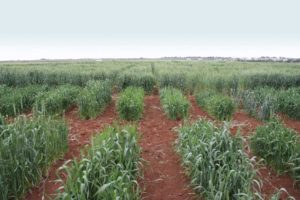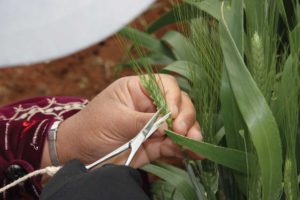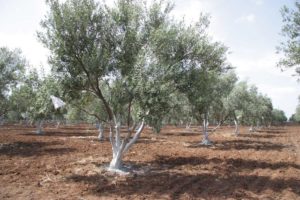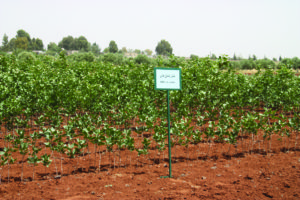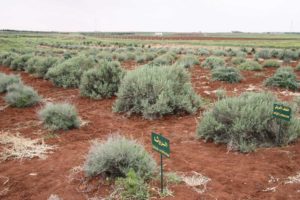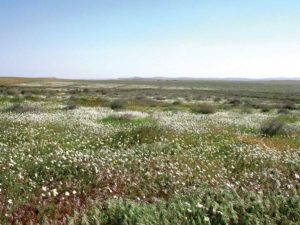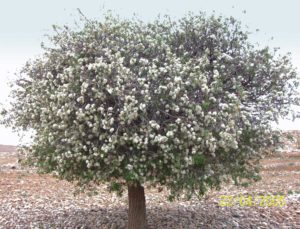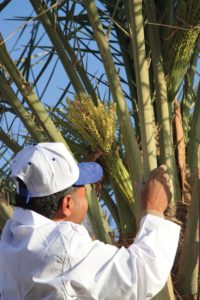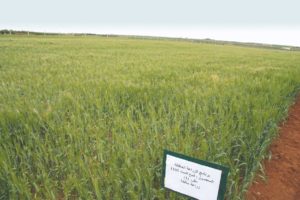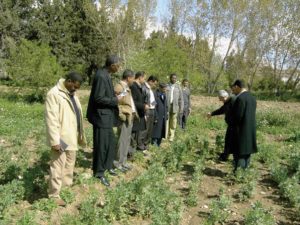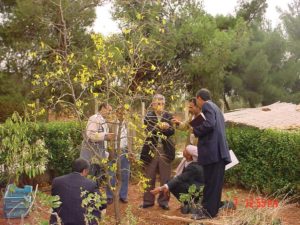Plant Resources Department
Tasks:
- Providing agricultural development programs of Arab countries with
reliable appropriate genetic resources of arid and semi-arid areas.
- Developing integrated agricultural technique packages to achieve the optimal utilization of arid and semi-arid areas.
- Correcting the environmental systems and setting up the necessary means for conserving their balance.
- Conserving Arab plant biodiversity and benefiting from the genetic biodiversity in the genetic breeding and improvement programs.
- Inventorying, collecting, evaluating and conserving genetic resources, as well as utilizing them in the Arab agricultural development programs.
- Participating in the programs of desertification areas rehabilitation and development.
- Documenting and disseminating research and study results at the level of technicians and farmers.
- Training technical staffs in all various fields of the department and disseminating and transferring the study results.
Programs and Projects
The department implements its activities through the following main programs:
- Cereal program:
This program aims to improve cereal crop productivity, particularly bread wheat, durum wheat and barley, increase their productive capacity under the conditions of Arab arid and semi-arid areas, and develop the cultivation of sorghum and millet crops due to their nutritious and fodder importance and high drought-resistance trait.
These objectives are achieved through the following activities:
- Collecting and conserving the genetic resources of cereal crops to be utilized in the genetic breeding and improvement programs.
- Developing varieties of durum wheat, bread wheat and barley, that are tolerant to biotic stresses (drought, salinity, high temperature and frost) and resistant to diseases, while conserving their productive capacity and qualitative properties.
- Testing the performance of superior lines in the Arab different environments.
- Identifying the appropriate agricultural techniques (seeding rates, fertilization, cultivation dates, tillage methods, cultivation depth, weed control….etc).
- Developing the cultivation of sorghum bicolor and millet crops, and developing highly biotic stress-tolerant lines.
- Producing the seeds of (G1 and G0) of the selected lines to be distributed among national programs.
- Contributing to the development and cultivation of cereals in the Arab World through regional projects implementation.
Fruit tree program:
This program aims to improve the productivity of fruit trees that are appropriate for Arab arid and semi-arid areas (olive, almonds, pistachio, figs and grapes), conserve the reliable genetic material and provide Arab countries with it.
This can be achieved through the following activities:
- Inventorying and evaluating genetic resources, selecting fruit tree varieties and lines, improving their qualitative and quantitative properties and disseminating them among Arab countries.
- Identifying and applying the appropriate agricultural techniques to serve and take care of fruit trees.
- Identifying the best methods for the propagation of the various varieties, and the best solutions for overcoming the factors that restrict the success of their use, and studying the use of wild resources in seedling production.
- Establishing breeding fields, gene banks and nurseries for the Arab arid and semi-arid environments.
- Conducting researches and studies on genetic improvement and environmental adaptation of olives, pistachio and almonds.
Rangeland and forestry resources program:
This program includes two projects:
- Rangeland conservation and management.
- Forestry resources management and environmental systems rehabilitation in the arid and semi-arid areas.
The program aims to:
- Inventory, survey and correct the pastoral vegetative cover, and identify the grazing systems, rotations and seasons.
- Rehabilitate and cultivate the degraded pastoral areas with highly fodder-nutritious and environment-beneficial pastoral species.
- Establish gene banks and breeding fields for the highly fodder-nutritious and environment-adaptive pastoral species.
- Collect, evaluate and classify pastoral species, and select the highly environment stress-tolerant genotypes aiming at propagating and distributing them among Arab countries.
- Study pastoral vegetation changes and prepare plant and pastoral maps.
Biodiversity program:
It aims to:
- Document biodiversity in the Arab World by inventorying species that grow in the Arid and semi-arid environments, and collect and deposit samples at the central herbarium.
- Issue the atlases that are concerned with biodiversity aspects, especially the economic ones.
- Build databases that meet the requirements of research and development programs, such as programs of rangeland development, desertification combat, biodiversity protection and scientific researches.
- Support other programs with the plant genetic varieties of economic importance.
- Coordinate among Arab countries to implement the Convention of Biodiversity (CBD) and Cartagena Protocol for Biosafety.
Date palm tree program:
The program aims to develop and improve the cultivation of date palm trees in the Arab countries through handling and harvesting operations improvement, in addition to integrated pest management and extension activity promotion.
These objectives can be achieved through the following activities:
Applying the techniques of tissue-culture and genetic engineering, and programs of integrated pest management to produce highly-resistant varieties.
- Promoting extension activities on the various operations of date palm tree handling and harvesting.
- Conducting awareness campaigns on the importance of dates and encourage date agro-industries.
- Conducting comprehensive survey for the areas of date palm tree cultivation and date production to prepare a date palm tree encyclopedia.
- Establishing a date palm off-shoots field to serve as a gene bank for conserving the important varieties.
- Preparing extension bulletins and reference articles.
Conservation agriculture program:
This program encourages farmers in the Arab countries to adopt the conservation agriculture system, and aims to:
- Improve crop productivity.
- Achieve sustainable agricultural production in the targeted environmental areas.
- Improve farmers’ income by decreasing agricultural production costs.
- Improve irrigation water management, alleviate the severity of drought by increasing the rate of soil moisture and the efficiency of rainfall water use.
- Build Arab agricultural institutions’ capacities in the field of sustainable agricultural production, and increase the awareness of researchers and technicians towards the positive impacts of conservation agriculture in terms of environmental, economic and social aspects.
Training activities:
The department implements training courses and workshops in all its various fields of work (cereal crops, fruit trees, rangelands and forestry resources, agricultural biodiversity, date palm trees and conservation agriculture). The aim is to transfer knowledge and modern agricultural techniques to Arab countries, in addition to the reached researches and studies.
The most important fields of training and workshops:
- Biotic and abiotic stress- tolerant cereal crops breeding (wheat and barley).
- Cereal productivity improvement in arid and semi-arid areas.
- Development of fruit tree lines that are appropriate to arid and semi-arid areas.
- Rangelands conservation and management.
- Plant genetic resources.
- Agricultural biodiversity conservation and use in sustainable development.
- Propagation of improved varieties’ seeds.
- Establishment of fruit tree and pastoral plant nurseries.
- Gene banks.
- Agricultural technology transfer to farmers.
- Technical service and care operations of date palm trees, and date palm tree propagation methods.
- Dissemination of conservation agriculture applications.
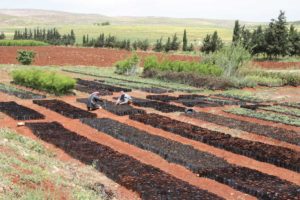 reliable appropriate genetic resources of arid and semi-arid areas.
reliable appropriate genetic resources of arid and semi-arid areas.